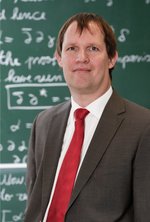
Mathematics
Mathematics as a pure science is concerned with fundamental structures and as a cross-disciplinary science communicates closely with many other disciplines. It is in these diverse roles that mathematics continues to evolve from within itself and also out of an array of applications that could hardly be more diverse. The outcome is a discipline that is alive, full of powerful contrasts and unexpected connections. All this is reflected in the thematic scope of the Faculty of Mathematics, whose 28 research groups make it one of the largest in Germany.
The Faculty predominantly works in four main fields, each of which has its own particular direction within this diversity. Pure research is most apparent in the field of “Algebra, Algebraic Geometry and Number Theory”, which deals with general structural concepts but often in geometric contexts. “Analysis, Numerical Analysis and Optimization” is chiefly concerned with partial differential equations; these are the kind of equations on which mathematical description of natural and technical processes is almost always based but which also have interesting connections with geometry. The field of “Stochastics” meanwhile considers probabilities and extends roughly from pure mathematical measure theory to applications in fields such as financial mathematics. The “Didactics of Mathematics” deals with teaching and learning mathematics and has expertise on all levels and all types of school education.
Between 2012 and 2014, the Duisburg-based research groups gradually relocated to Essen, where the Mathematics Carrée in the Weststadt district simultaneously became the new home of the Faculty of Mathematics. At the end of 2014, the mathematics research groups from the Institute for Experimental Mathematics were also integrated in the Faculty, which means that all fields of mathematics at the University are now united in a single building. Particularly in the fields of Analysis, Numerical Analysis and Stochastics, which were previously divided between two cities, this now enables us to develop existing collaborative approaches and equip the Faculty for the future. A small group of mathematicians remains in Duisburg to ensure that we can continue to offer the same quality of mathematics to the relevant subjects there and keep contact with these subjects alive on a day-to-day basis.
The members of the Faculty of Mathematics share their fascination with their subject in degree programmes in Mathematics, Technical and Business Mathematics (Bachelor/Master), in the teacher training programmes for all school levels, and in a series of events provided to other faculties. Doctoral training takes place as part of a large group of postgraduate students from all over Germany and abroad at the University of Duisburg-Essen in the International Graduate School in Mathematics
The following report introduces the four main areas of our Faculty together with an outline of their collaborative work and research projects. A summary of just some DFG research projects is provided here:
- Essen is one of three locations with Bonn and Mainz to host the Collaborative Research Centre (SFB)/Transregio 45 “Periods, moduli spaces and arithmetic of algebraic varieties”.
Research groups from the Faculty are or have been involved in the following projects during the reporting period:
- SFB/TR 12 “Symmetries and Universalities in Mesoscopic systems”
- SFB/TR 154 “Mathematical Modelling, Simulation and Optimization Using the Example of Gas Networks”
- SFB 823 “Statistical modelling of nonlinear dynamic processes”
- Priority Programme 1253 “Optimization with partial differential equations”
- SPP 1489 “Algorithmic and Experimental Methods in Algebra, Geometry and Number Theory”
- SPP 1590 “Probabilitstic Structures and Evolution”
- SPP 1748 “Reliable Simulation Techniques in Solid Mechanics”
- SPP 1786 “Homotopy theory and algebraic geometry” (initiated and soon to be coordinated by Prof. Marc Levine)
- Research Training Group 1855/1 “Discrete optimization of technical systems under uncertainty”
- German Centre for Mathematics Teacher Education (funded by Deutsche Telekom Stiftung); Didactics is involved in various ways here and in many coordinated projects, which are described in greater detail below.
Further projects are funded by bodies such as the EU, BMBF, Humboldt Foundation and Deutsche Telekom Stiftung.

